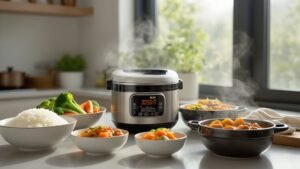Although the average rice cooker is a pretty reliable appliance, like all appliances, it does have a limited lifespan, and knowing when to replace it is essential to maintaining optimal performance.
In this article, we will explore the typical lifespan of a rice cooker, signs that indicate it’s time for a replacement and factors to consider when choosing a new rice cooker.
Table of Contents
ToggleKey Takeaways:
- Replacing your rice cooker is essential to maintaining efficient cooking performance.
- The lifespan of a rice cooker can vary depending on factors such as usage frequency and model quality.
- Signs that indicate it’s time for a replacement include inconsistent cooking results, damaged parts, and unusual noises.
- Factors to consider when choosing a new rice cooker include repair costs, the availability of spare parts, and technological advancements in newer models.
- Regular maintenance and proper storage can help prolong the lifespan of your rice cooker.
Understanding Rice Cooker Lifespan
Knowing the lifespan of your rice cooker is essential for optimal cooking results and maintaining efficiency.
The average rice cooker typically lasts between 5-10 years, but factors such as usage frequency, quality of materials, and maintenance practices can all affect its durability.
Most experts recommend replacing your rice cooker every 5 years to ensure that it’s working at peak performance. Over time, wear and tear can cause the cooking time to become inconsistent, or the rice may not be cooked evenly. This can lead to overcooked or undercooked rice, affecting the overall taste and texture of the dish.
Factors Affecting Rice Cooker Lifespan
The lifespan of a rice cooker can vary depending on several factors. For example, the material of the inner pot affects the product’s longevity, and stainless steel or aluminum pots are sturdier and generally last longer than non-stick-coated ones.
The frequency of usage is another significant factor.
Frequent use can cause more wear and tear, potentially damaging the cooker’s parts and reducing its lifespan.
Of course, proper maintenance, including regular cleaning and storage, can help extend its lifespan.
Additionally, mishandling the rice cooker can cause long-term damage. For example, dropping the cooker or exposing it to excessive heat can damage its internal components and shorten its lifespan.
By understanding the factors influencing the lifespan of a rice cooker, you can take appropriate measures to ensure that it lasts longer and functions optimally.
Signs of a Worn-Out Rice Cooker
After years of use, it’s common for rice cookers to show signs of wear and tear. Here are some indicators that it’s time to consider replacing your rice cooker:
| Sign | Description |
|---|---|
| Inconsistent Cooking Results | If your rice cooker is no longer producing perfectly cooked rice, it may be time for a replacement. Over time, wear and tear can cause the heating element to malfunction, resulting in undercooked or overcooked rice. |
| Damaged Parts | If any part of your rice cooker appears cracked, broken, or heavily worn, it’s best to replace the unit. Continued use with damaged parts could pose a risk of electrical hazards or other safety concerns. |
| Unusual Noises | If your rice cooker is making strange noises during the cooking process, it could be a sign that the internal components are wearing out. These noises may include hissing, crackling, or popping sounds. |
| Steam Leakage | If you notice that steam is leaking from your rice cooker during cooking, this could be a sign of compromised seals or gaskets. It’s important to replace the unit to prevent potential safety hazards. |
When one or more of these signs are evident, it’s best to consider replacing your rice cooker. Continuing to use a worn-out rice cooker can not only lead to subpar cooking results but also pose safety hazards.
Factors to Consider for Replacement
Deciding whether to replace a rice cooker can be a difficult task, especially when considering factors such as repair costs and the availability of spare parts. Here are some key factors to consider:
| Factor | Consideration |
|---|---|
| Repair Costs | If the cost of repairing your rice cooker is more than half the price of a new one, it may be better to opt for a replacement. |
| Spare Parts | It is important to consider whether spare parts are available for your rice cooker. If they are difficult to find or costly, it may be time to get a new one. |
| Cooking Functions | If you find yourself cooking more advanced rice dishes, it may be worth investing in a rice cooker with more cooking functions and settings. |
| Technological Advancements | Newer models of rice cookers may have advanced features such as induction heating or improved cooking algorithms, which can provide better cooking results. |
| Capacity | The size of your household should be taken into account when choosing a replacement rice cooker. If you have a larger family or regularly entertain guests, a larger capacity rice cooker may be necessary. |
| Price Range | Rice cookers can vary greatly in price, so it is important to set a budget and find a model that fits within it. |
| User Reviews | Reading reviews from other users can provide valuable insight into the performance and durability of different rice cooker models. |
Considering these factors can help you make an informed decision about whether to replace your rice cooker and which model to choose as a replacement.
Extending the Lifespan of Your Rice Cooker

Rice cookers are a valuable appliance in any kitchen, and with proper care, they can last for many years. Here are some tips to help you extend the lifespan of your rice cooker:
- Clean your rice cooker after every use to prevent any buildup of residue.
- Do not immerse the base of your rice cooker in water. Instead, use a damp cloth to wipe it down.
- Avoid exposing your rice cooker to extreme heat or direct sunlight.
- Store your rice cooker in a dry, cool place when not in use.
- Check the power cord and plug for any signs of damage or wear and tear.
- Use the appropriate amount of water and rice in your cooker to prevent overworking the machine.
- Do not use metal utensils in your rice cooker, as they may scratch the non-stick coating.
By following these simple tips, you can keep your rice cooker functioning optimally for a longer period. Not only will this save you money on replacement costs, but it will also provide consistently delicious rice every time you use it.
Upgrading to a New Rice Cooker
If you’ve determined that it’s time to replace your rice cooker, you may want to consider upgrading to a newer model instead of repairing your old one. Upgrading to a new rice cooker can offer several benefits that can enhance your cooking experience and provide superior results.
Advantages of a New Rice Cooker
Newer rice cookers often come equipped with advanced features and technologies that can improve the efficiency and quality of your cooking. For example, some models have fuzzy logic technology, which can adjust cooking times and temperatures based on the type of rice being cooked for optimal results.
In addition, newer rice cookers come in various sizes and shapes to fit different cooking needs, from single servings to large meals. They may also offer additional cooking functions, such as steaming and slow cooking, to expand your culinary repertoire.
Considerations before Upgrading
Prior to upgrading, consider the features that are most important to you and your cooking needs. Ask yourself questions such as:
- What type of rice do I cook most often?
- How often do I cook rice?
- What is my budget?
You may also want to read user reviews or consult with experts to ensure you select a model that meets your requirements.
Ultimately, upgrading to a new rice cooker can be a worthwhile investment that can improve the quality and convenience of your cooking.
Choosing the Right Replacement Rice Cooker
When it comes to selecting a replacement rice cooker, there are several factors to consider. Here are some tips to keep in mind to help you make an informed purchase decision:
| Factor | Description |
|---|---|
| Capacity | Determine the right size for your household and cooking needs. Rice cookers typically range from 3 to 10 cups. |
| Cooking Functions | Consider the types of rice you will be cooking and if you need additional features such as a steamer or slow cooker function. |
| Price Range | Set a budget and compare the prices of different models to find the best value for your money. |
| User Reviews | Read reviews from other customers to get an idea of the product’s reliability, ease of use, and overall performance. |
Remember to also consider your own personal preferences and needs when choosing a replacement rice cooker. With the right research and selection, you can find a new rice cooker that will provide optimal cooking results for years to come.
Conclusion
In conclusion, knowing when to replace your rice cooker is crucial in achieving optimal cooking results. While the average lifespan of a rice cooker may vary depending on factors such as usage frequency and maintenance, signs of wear and tear, such as inconsistent cooking results and damaged parts can indicate the need for replacement.
Factors such as repair costs and availability of spare parts should be considered when deciding whether to replace an old rice cooker or upgrade to a new one. Additionally, proper maintenance techniques such as regular cleaning and storage can help extend the lifespan of a rice cooker.
If upgrading to a new rice cooker, it is important to consider factors such as capacity, cooking functions, price range, and user reviews to make an informed decision. Ultimately, investing in a quality rice cooker can enhance the cooking experience and provide superior results.
By following the tips and information provided in this article, readers can make an informed decision about when to replace their rice cooker and choose the right replacement for their needs.
FAQ
Q: When should I replace my rice cooker?
A: It is recommended to replace your rice cooker when it shows signs of wear and tear or is no longer providing consistent cooking results.
Q: What is the average lifespan of a rice cooker?
A: The average lifespan of a rice cooker can vary depending on the quality of the appliance and frequency of use. However, most rice cookers tend to last between 5 to 10 years.
Q: What are the signs of a worn-out rice cooker?
A: Some common signs that indicate a rice cooker is reaching the end of its lifespan include inconsistent cooking results, damaged parts, and unusual noises during operation.
Q: What factors should I consider when deciding to replace my rice cooker?
A: Factors to consider when deciding whether to replace your rice cooker include repair costs, availability of spare parts, and technological advancements in newer models.
Q: How can I extend the lifespan of my rice cooker?
A: To prolong the lifespan of your rice cooker, it is important to practice regular cleaning, avoid exposing the appliance to excessive heat, and store it properly when not in use.
Q: What are the benefits of upgrading to a new rice cooker?
A: Upgrading to a new rice cooker can provide features and innovations that enhance the cooking experience and offer superior results compared to older models.
Q: How do I choose the right replacement rice cooker?
A: When selecting a replacement rice cooker, consider factors such as capacity, cooking functions, price range, and user reviews to make an informed purchase decision.
Last update on 2025-10-09 / Affiliate links / Images from Amazon Product Advertising API






